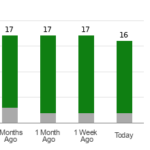As a regular listener of the “All-In” podcast, hosted by esteemed venture capitalists, I recently found myself captivated by a discussion on the potential of a looming U.S. recession. The nuanced dialogue probed the depths of this economic concept, illuminating the confusion and misconceptions that often shroud the term “recession” on Wall Street.
Amateur investors frequently grapple with the true essence of a recession and its repercussions on stock prices. In this exposé, we delve into the essence of a recession, unravel stealthy signs indicating a covert downturn, and illuminate the repercussions a recession might have on the Wall Street landscape.
The Precision of a Definition: What Constitutes a Recession?
Often, the term “recession” is employed as a catch-all phrase for a sluggish economy with high unemployment rates. Yet, the definitive criterion for a recession dictates two consecutive quarters of declining Gross Domestic Product (GDP). Precision is paramount; a precise definition is a compass for analyzing historical data and discerning past recessions’ impacts.
Stealthy Signs: Are We Already Engulfed in a Recession?
Indicators of Consumer Weakness
Recent signs point to consumer weakness, exemplified by glaring revenue downturns in companies such as Airbnb (ABNB) and the resounding success of Upstart (UPST) in the face of economic turmoil.
Government Spending vs. GDP
Government expenditure has surged, masking the private sector’s potential recessionary tendencies. The disproportionate reliance on government spending for economic sustenance skews the true recession narrative.
The Federal Reserve’s Tug-of-War: Potential Rate Cuts in the Horizon
Poor Employment Figures: Catalyst for Rate Cuts
Jerome Powell and the Federal Reserve walk a tightrope, considering an imminent interest rate cut amidst escalating unemployment rates. Recent data indicates a jittery economic landscape, hinting at the necessity of swift monetary policy adjustments.
The Ripple Effect: Housing Boom and Small Caps
Anticipated rate cuts could breathe new life into stagnant market segments, particularly the housing sector. With rates potentially spiraling downwards, the housing and small-cap markets stand to gain momentum, catalyzing a fresh wave of economic resurgence.
Insights into Financial Markets: The Dance of Stocks and Recessions
The real estate giant Lennar (LEN) has had a bountiful run in the markets. Meanwhile, small caps and the Russell 2000 Index (IWM) have been struggling under the heavy weight of increasing interest rates. Small caps, with their precarious debt levels and variable borrowing rates, have felt the pinch more acutely in comparison to their large-cap counterparts.
The Tech Sector’s Resilience
Amidst substantial government expenditures, the ascent of artificial intelligence (AI) and the tech industry has propelled GDP growth, whereas other segments like small caps have faltered. Although the AI boom is no clandestine affair and the initial euphoria may have waned, Zacks Consensus Estimates predict continued growth up to 2025 as profit margins expand in tech entities such as Arm Holdings (ARM).

Image Source: Zacks Investment Research
Considering the Fallibility of Pundits and Analysts
Many financial analysts have been prophesying an impending recession. However, historical data exemplifies the difficulty of foretelling economic downturns, even for the most astute minds. For instance, billionaire Stanley Druckenmiller has erred in predicting recessions multiple times in recent years. In contrast, Elon Musk, Tesla’s (TSLA) CEO, known for his extensive business involvements, has been anticipating a downturn since late 2022.
The Intriguing Dance of Economies and the Stock Market
A comprehensive analysis by Russell Investments sheds light on the often tenuous relationship between recessions and stock market performance. The report articulates:
“Examining the 31 recessions spanning from 1869 to 2022 as detailed in our comprehensive report, the correlation between U.S. stock market returns and GDP variations during these 31 recessions stands at 0.30. This positive correlation is primarily influenced by the 2020 recession, in which GDP plummeted by 17.8% on an annualized basis, resulting in a 63.4% market decline. Excluding this period, the correlation approximates zero.”
The Future Outlook: A Spotlight on Stock Behavior
Fretting over an impending recession often proves futile given that, typically, stocks start to wane around five months ahead of a recession onset. The predictive power of recessions on stock prices remains limited (save for hindsight), with recessions themselves posing significant challenges in prognostication.
Concluding Thoughts
Wall Street might have encountered an obscured recessionary spell in 2022 overshadowed by copious government expenditure. However, the twin factors of interest rate cuts and the robust tech domain are poised to shield the U.S. economy from a genuine recession. Nevertheless, stocks have a penchant for ascent despite the prevailing economic winds.






